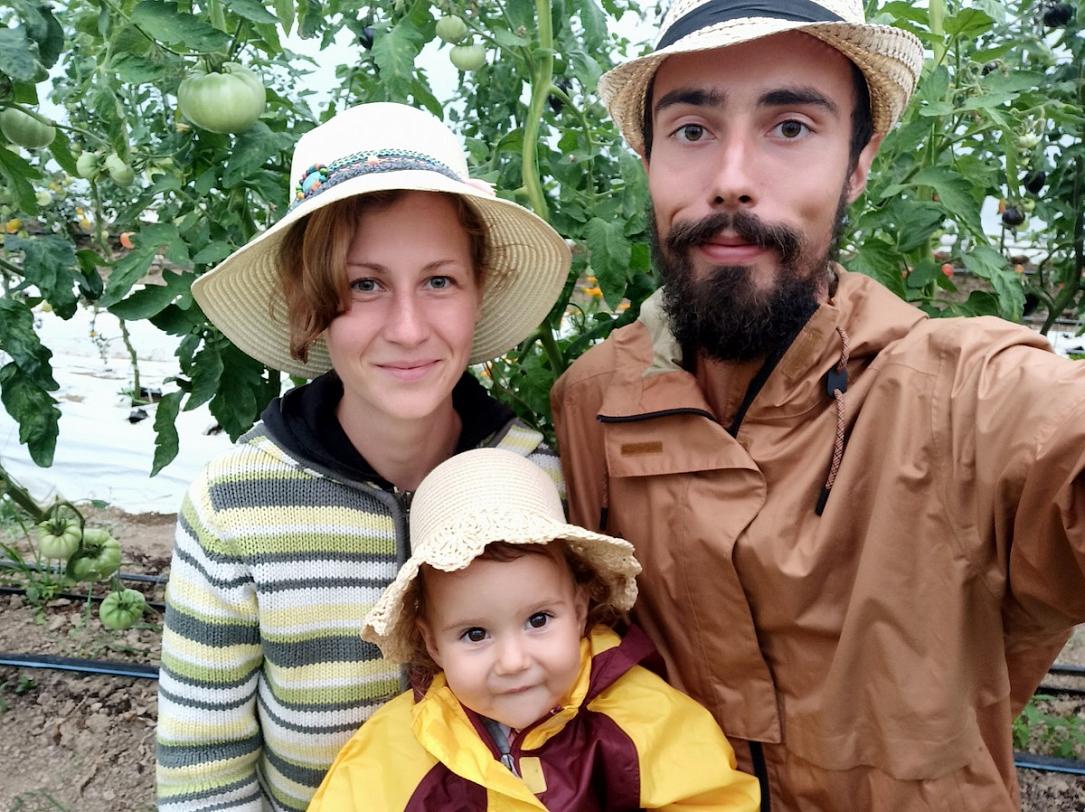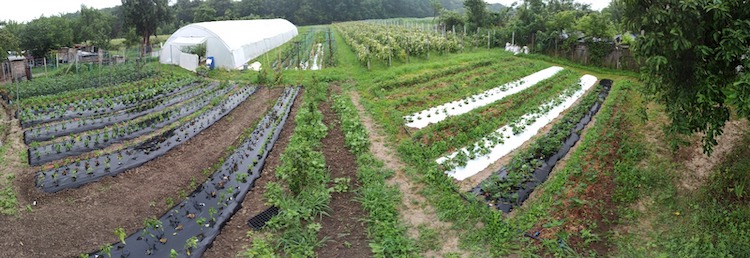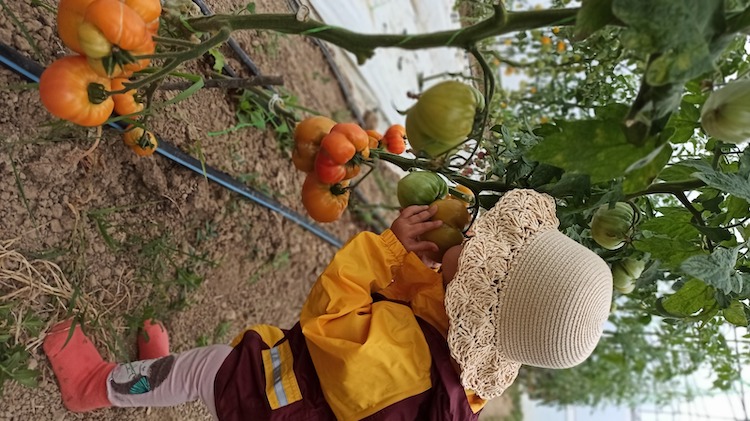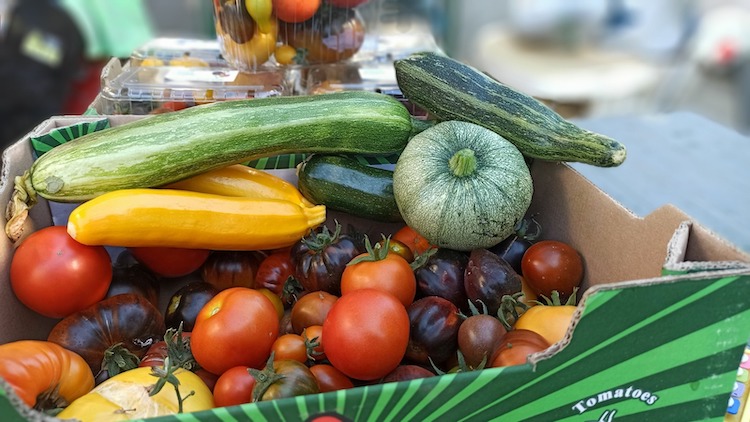Two young Romanians leave the big city to pursue their dream of becoming organic farmers in a small village



Both Laura and Antim were born in the region on Moldova, in eastern Romania - Laura in the city of Pascani and Antim in Barlad. They met in Bucharest, however, at the Faculty of Horticulture, where they discovered and cultivated their passion for regenerative organic farming. They kept going on this path even after graduation, taking on jobs and courses that helped them acquire more valuable information and practical experience.
After seven years in Bucharest, motivated by their daughter's birth, Laura and Antim decided it was time to leave the big city life and live their dream of becoming organic farmers. Thus, the two horticultural engineers moved to the small village of Homita in the Moldova region, where they turned an abandoned family land into a farm producing organic vegetables.
Starting the Scufita din Homita Farm was not easy, but the young family managed to see their dream come true with hard work. The initial investment was around EUR 10,000.
"In February 2020, we built the first greenhouse and sowed our first seedlings, then, with the help of our parents, we built the fence, prepared the soil in the garden, and installed the irrigation system," Laura told Romania-insider.com.
The organic farm in Homita is now producing a wide range of organic vegetables, from tomatoes of all sizes and shapes and the hottest varieties of peppers in the world to eggplants, potatoes, cabbage, broccoli, black radish, and carrots of different colors. All these fresh goodies can be delivered at home, but customers can also find them at a small farmers' market in Iasi.
Laura Antim shared the story of the Scufita din Homita organic farm with Romania-insider.com in the interview below.

Please tell us a bit about your background.
I, Laura, was born in Pascani, and Antim was born in Barlad. We are 29 years old, and we were both students at the Faculty of Horticulture in Bucharest, where we met.
We are horticultural engineers, and we have both been passionate about regenerative organic farming since university. We understood the importance of growing organic vegetables both for the health of consumers and for the environment. At the same time, we realized how important it is for the soil to be healthy and fertile, being the substrate that nourishes vegetables and ensures the vigor, resistance, and health of plants. That is why we practice regenerative ecological agriculture on our farm.
With these ideas in mind during college, we tried to gain as much practical experience as possible after graduation. The first job was in an ultra-modern greenhouse producing vegetable and flower seedlings. Then we worked for several years within the Association Permaculture Research Institute of Romania, where we acted as consultants for organic farms around Bucharest while also being in charge of the design, implementation and maintenance of community urban gardens and orchards and family vegetable gardens.
At the end of 2020, we received a scholarship of EUR 2,000 from Richard Perkins (a farmer who founded Ridgedale Farm, one of the most famous and successful organic regenerative farms in the world) to take his online course. This has helped us a lot in our specialization.
After many years in Bucharest, you have decided that it is time for a change. When and how was the idea of an ecological farm born, and why did you choose the village of Homita? Do you miss something from life in Bucharest?
While studying at the university, we sadly found that Romania is behind the western countries when it comes to organic farming. Many farmers do not understand what this type of agriculture means, and without precise technologies for organic cultivation, I don't believe that this type of farming is really possible. Even at the faculty, most teachers neglected this type of agriculture and strongly advocated for conventional agriculture, which uses chemicals harmful to the environment and health. However, we were fortunate to meet some professors passionate about ecology (Assoc. Prof. Dr. Lagunovschi Luchian Viorica, Prof. Univ. Dr. Stanica Florin, Prof. Univ. Dr. Asanica Adrian and others), professors who later founded the master's program "Ecological Horticultural Sciences" that Antim also followed.
The information we gathered from these professors and from renowned farmers abroad (Jean-Martin Fortier, Richard Perkins, Elliot Coleman, Conor Crickmore, Ben Hartman, Allan Savory, Curtis Stone, and others) planted in us the desire to develop our own regenerative organic farm that, in addition to producing healthy food, also has an educational side, where people can come, see and learn the principles and practices that have convinced us to be efficient and responsible to people and the environment.
After our little girl was born, we got even more motivated, and our desire to raise our child in nature increased. So, in 2019, we moved to Homita village, to my grandparents' house, where there was an unused family land; and the village surrounded by forest seemed the perfect place for our idea of a farm. And that's precisely how it was.

As for our move from Bucharest to a small village in Moldova, we can say that the transition was quite smooth. We have many pleasant memories from our life in Bucharest, and this city will remain forever in our hearts, but the chaos in it, the hustle and bustle, and the time lost daily in traffic made us long for the quiet rural life. We have everything we want here, and whenever we miss the buzz of city life, we can go to one of the nearby cities (Pascani, Iasi, Suceava, Piatra Neamt, Bacau, etc.)
How long did it take you to arrange the Homita farm, and what did this process involve? How much did you invest, and how did you finance this project?
In the winter of 2019, we sat by the fire and made plans for 2020, the first production season of Scufita din Homita Farm. In February 2020, we built the first greenhouse and sowed our first seedlings; then, with our parents' help, we built the fence, prepared the soil in the garden, and installed the irrigation system. The initial investment was around EUR 10,000, and we covered it from our own funds.
This year, with support from our family, we have increased the investment, and we are in the process of expanding the farm. To meet the high demand for natural products in Iasi, we're installing three more greenhouses and expanding the cultivated area.
How has the Scufita din Homita Farm developed since its launch, and what are the future plans? What vegetables are the farm's "stars"?
The start was timid. We had all kinds of plants in our greenhouse, different varieties of lettuce (normal and curly, red and green), leaf mustard, mizuna, tatsoi, pak choi (red and green), Chinese cabbage, green onions, parsley, radishes, and seedlings, but due to the situation generated by COVID-19, we decided to only make deliveries in the city of Pascani.
In June, when the restrictions were partly lifted, we started participating in the "Green Weekend Market" on Stefan cel Mare Blvd. in Iasi, an event organized by the La Bacanie Association, together with the Iasi City Hall. Here we were pleasantly surprised by the high demand for organic products and the lovely people who came to buy vegetables from us every week. These customers truly lifted our spirits because, the financial part aside, we were lucky to meet people who have encouraged us and greatly appreciated our work. We are very grateful to them. Not long after, we were contacted by the cheerful team from the My Happy Market grocery store in Iasi, where we delivered vegetables until the end of the season.
In early September, we decided to try home deliveries, and we noticed that this way we can sell the entire production from a week in one day, so we paused our participation in the fair, and by the end of December, we delivered our vegetables weekly to about 25 families.
As for the categories of vegetables we're producing, they are diverse and numerous. The farm's stars have been the 54 types of tomatoes (red, green, yellow, orange, black, of all sizes and shapes). To these, we added red, yellow and brown bell peppers, kapia peppers, the hottest varieties of peppers in the world, eggplants, four types of zucchini (yellow, dark green, striped, and round), sweet corn, potatoes, green and purple kohlrabi, cabbage, cauliflower, broccoli, yellow, green and purple beans, celery, turnips, black radish, beets, carrots (orange, yellow, red and purple), four varieties of cucumbers, basil, spinach, fennel, and more. All these vegetables, even the least known on the Romanian market, have been loved and appreciated by our customers.

This year we're expanding the cultivated area as we want to be able to deliver healthy vegetables to as many families as possible. In addition to deliveries, we also intend to participate in the "Green Weekend Market" and deliver to the grocery stores in Iasi. We will continue to produce a wide variety of vegetables. We selected the types that had good yields last year and added other varieties for testing. In the future, we plan to try to integrate a mixed orchard and free range laying hens into our farm.
What does organic farming mean, and what are the advantages/disadvantages?
Organic farming involves following a set of rules established at the level of the European Union, rules that, among other things, prevent the use of: genetically modified organisms, fertilizers, synthetic chemical pesticides and fungicides, growth stimulants and regulators, hormones, antibiotics, etc.
We practice regenerative organic farming, which is, from our point of view, a superior method of production that can help solve many of the climate problems we face. In addition to the organic plant growth without synthetic chemicals, this system focuses on the regeneration and conservation of soil, water, and biodiversity, and the sequestration of carbon in the soil through the use of specific practices, such as: minimum tillage, the use of green manures, the growth of a large number of species in a biointensive way, the enrichment of soil microbiology through the use of compost and biopreparations, and so on.
We are not ecologically certified at the moment, and although we are strictly following all existing regulations at the European level (we use only products approved for organic farming), we are reluctant to apply for certification. The main reasons are the high fees charged by certification bodies (fees that would automatically be reflected in the price of our vegetables, and we try to keep prices as affordable as possible), and the excessive paperwork the farmer needs to put together, given his free time is very limited anyway.
We don't know what we'll choose in the future, but we do know that the concept of chemical agriculture is not an option for us, and neither is the idea of compromise. Specifically, we'd rather lose a crop in a difficult year than spray it with chemicals to save it. We're currently leaning towards a "certification" given by our customers, with whom we are 100% transparent and who can visit us at any time to see exactly how we grow the vegetables that reach their plates. In fact, creating a direct connection with our customers is very important for us. We are trying to build a small community, and we can say that we were lucky to meet beautiful people who resonate with our ideas.
Are Romanians more open to the idea of buying organic vegetables, of eating naturally?
We are not yet at the level of western countries, such as France, Germany, or Italy, but this segment has a spectacular growth in Romania, and we believe that the demand for natural products will continue to grow.
irina.marica@romania-insider.com
(Photos: courtesy of Laura and Antim Nechifor)